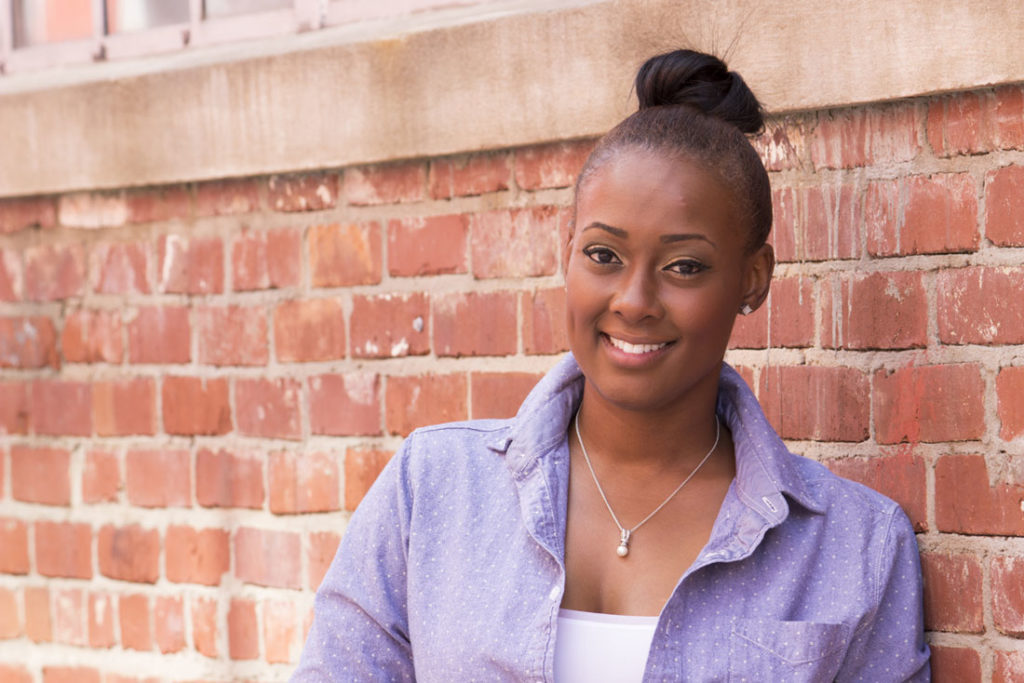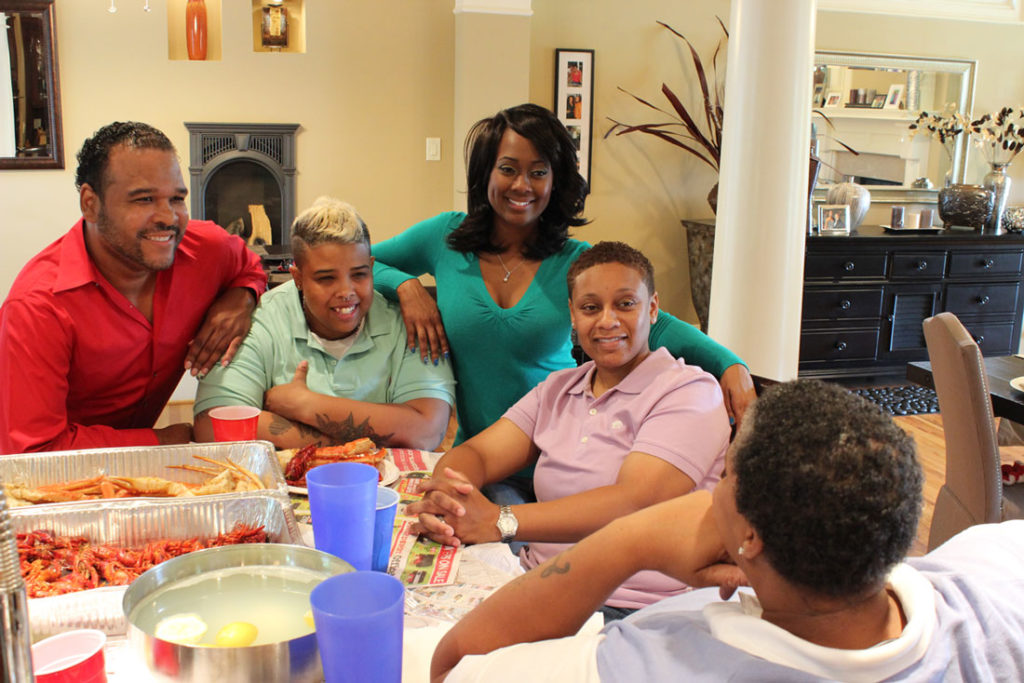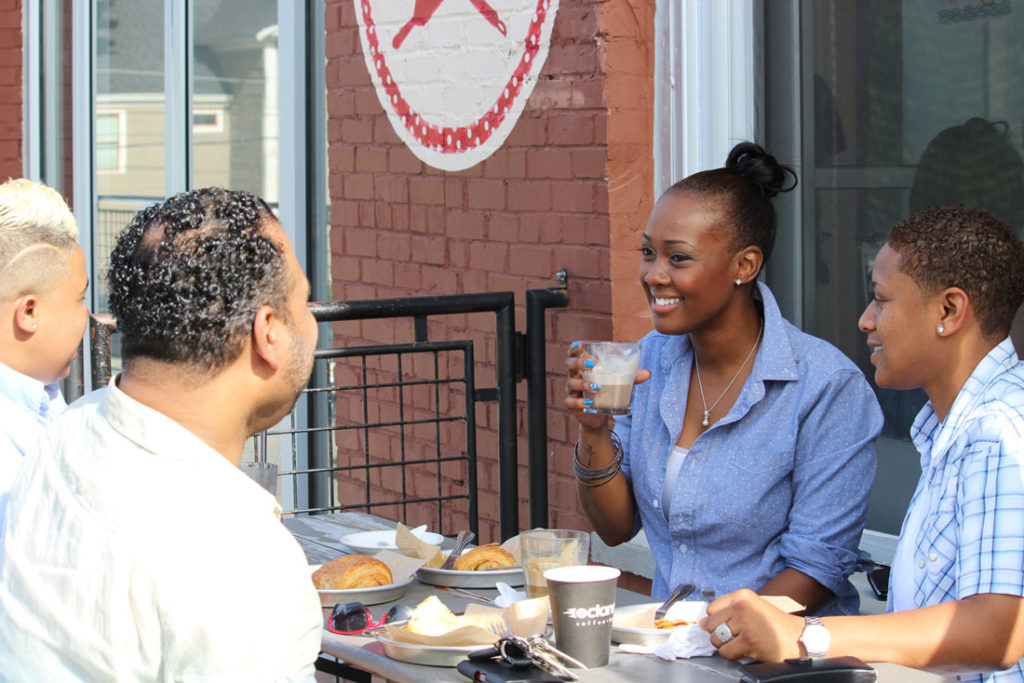Aina
I Am More Than My Diagnosis
My name is Aina, and this is my story.

Growing up in my community, we ignored behaviors and people seen as “crazy.” Without nuance, anyone with an emotional or mental health issue was lumped into one category – an inhuman category labeled “it.”As in, “That’s it alright. That’s crazy,” when confronted with one of the people who talked to himself in the middle of the street. I remember being pulled away, as if the “it” was contagious or to be feared like the zombie plague.
So early in life, I decided to act in a way that was the exact opposite of the dreaded “it.” I would give the people what they want. I would smile, dance and keep them laughing. That approach to life and relationships led me to the very thing I was trying to avoid.
But back then I didn’t know all that. I just knew that smiling was better than crying. Crying was unacceptable. Instead I found another way to express my pain.
At eight years old, I have my first memories of cutting to release my pain.
This was my secret thing, where I could do whatever I wanted in private without anyone to judge. I would go into the bathroom, retrieve my hidden blade, and pierce my skin just enough to…release. As the blood began to flow, I felt the pain slip away.
By the time I was 15, I was a pro – I knew just the right angle and depth. I graduated to my legs so my arms could heal.
Cutting was not an attempt to kill myself. Cutting relieved my pent up anger or sadness.
I didn’t want attention; I just wanted to feel something different. But it was always temporary. Days later, I would look at myself naked in the mirror and cry because I had made myself even more ugly.
Most teens struggle with body image, but I struggled with being a girl with a dark complexion. A stigma has always existed in the black community about being “too dark”, but in the late 80s to mid 90s it was heavily televised. And for my generation, if it was on television, it was truth. So being teased with, “You so ugly, you so black,” shaped my image of beauty and self-worth.
My mother was light-skinned. She also was extremely intelligent, driven, witty and beautiful, and everyone loved being around her. My “friends” would say, “That’s your mother?! Oh she’s beautiful.” I always heard the silently implied follow-up question, “So how
did you get so ugly?” But I was funny!

I am more than my diagnosis. I am intelligent, driven, and funny. I am a wife, a sister, a friend. I am beautiful.
Then my mother became the parent liaison for my high school and the director of my afterschool program. It was too much. But as my mother’s daughter, I had friends by association. Or so I thought. In reality – between the people kissing up to my mom to avoid reprimand and the people who hated my mom (and me) because they had already been reprimanded – none of these relationships had anything to do with me. And every time I was confronted with this reality, I needed to release some tension.
Sometimes cutting worked. When it didn’t, my mind wandered off into experiments of permanent solutions. I still thought I was totally living under the radar, that no one could see my “crazy” or my scars.
Honestly I thought those trips to the therapist were because my mom and I occasionally got into spats. I didn’t know any better because I wasn’t included.
My mother and the therapist would talk behind the closed door, and I waited in the lobby. Then they would invite me in, the therapist would ask me some really random questions, and we would go home.
Sometimes my whole family would have meetings about me. Thinking I was in trouble, I stayed away. I never imagined my family would be talking about my mental health. I thought I was tricking everyone. I was living the minstrel show – how would they notice my scars? And they never involved ME.
Finally I was off to college. Finally! Some control and SPACE! I was at the top of my class, so I received a full academic scholarship. I finally could make my own friends based on my own character. But college was dreadful. I cried and cried, and I barely made it
out alive. My cutting increased, and I began to get tattoos to cover up my scars. I contemplated suicide daily, and it was the first time I really thought it was my only option.
But then, a light at the end of the tunnel. My humorous interpersonal skills, analytical brain, and competitive spirit – coupled with my love for money – propelled me into an extremely lucrative career in banking. It was a new day. On television, because of the efforts of Oprah, Angela Basset, and Laurynn Hill, dark skin was on the come up. I was comfortable, happy with myself overall, and I was doing great! In 2004, I was named the youngest AVP in the Northeast. I expanded my career, lived a fabulous life in London, and traveled the world repeatedly. Then I finally got my wish and grounded myself in the booming market of international banking in Miami. And then, at the height of my career, it was taken away from me. The one thing I was good at.
The feelings I had suppressed for years exploded out of my body for the world to see. Cutting didn’t help. I couldn’t tap dance and perform like I used to; I lost my act at the minstrel show.
I landed in treatment center after treatment center where, like in my childhood, no one talked to me. I was a diagnosis. I was depression.
I often was treated like a criminal. One time I was stripped down naked and asked to spread my legs and cough – just to make sure I didn’t have any contraband. My childhood memories of “the crazies” began to haunt me. Had I become the zombie? Was I an “it” now? I mean, being treated like I was, I couldn’t imagine I was human. Compared to my fears, suicide just seemed waaaaay easier.

It wasn’t until I went to Skyland Trail that, for the first time in 33 years, someone asked me what I wanted and included me in my treatment plan.
There was no treatment in this treatment center. And I couldn’t totally blame them, because I complied. I did want to get better. And what did I have to be depressed about? I am blessed right? Depression isn’t real right? Snap out of it Aina! I didn’t have an illness. I just needed to just go on ahead and stop being dramatic because depression is what rich housewives get. I couldn’t afford to be
sitting around wasting everyone’s time.
Time passed and nothing changed, except my medication. And that made me change in too many ways, none of which I thought was working. And still … no one asked me.
It wasn’t until I went to Skyland Trail that, for the first time in 33 years, someone asked me what I wanted and included me in my treatment plan.
My treatment team challenged me on my thinking about mental illness, and my coping mechanisms that I used to subdue my pain. Now, I’m smart, but I honestly didn’t know there were other options besides death and cutting that I could use to manage my painful emotions. For the first time I began to peel back my perception of what I was feeling and thinking and no longer hid from or became disgusted by my mental illness.
For the first time in many years of pain, I wasn’t suffering in silence. And that’s when I started to get better.
So today, I challenge you. If you have issues to work through, it’s ok to own it. You are not a casualty of the zombie plague. And speak up. It’s ok to assert your choices for your treatment plan and your life. Because it’s your life. Family members, embrace your loved ones, and get educated on how to deal with mental illness because your words and actions make all the difference.
Don’t forget we are human and we hear you. Try not to perpetuate the stigma that we should be ignored, exiled, or criminalized because I am more than my diagnosis.
I am not an “it”. I am intelligent, driven, and funny. I am a wife, a sister, a friend. I am beautiful.
